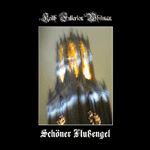 There's something new churning inside the supernatural bones of thesesongs. The world of instrumental evolution and ultra-processed sound isripe with abrasiveness and cosmic dust. While most of what KeithFullerton Whitman releases under his own name is numinous and hazy,there's an extra dose of the dark and unfathomable on Schöner Flußengel. Bits and pieces of Antithesisremain on this record; the album moves via the progression of obviousinstrumentation and recognizable musical elements. The record floats,however, in a way that its predecessor did not. Whitman's melodicmovements are seemingly circular and they build a labyrinthinestructure that lacks no amount of intimidation. "Lixus (VersionAnalogique)" opens the album with the ghastly moan of cymbalsscratching against each other, but the cymbals give way suddenly to aguitar melody that will be repeated later in the album. Lightpercussion highlights this oddly looped melody until strange soundsbegin to shine over it and place it within the context of something fargreater than itself. The guitar falls away into an abyss of heavy andsubtle percussive elements and whale-like echoes. Immediately followingthis thematic opening is a giant hole in the space-time continuum. It'sas though a massive star collapsed in on itself right in the middle ofthis record and left a record of its nature. The massive and meandering"Bewusstseinserweiternd Tonaufnahme (Einer & Zweiter Teile)" is aconfounding piece of recording. Like a mammoth and unmovable monumentdedicated to the ruinous gods of the ancient world, it towers over therest of Schöner Flußengel and establishes the tone that comesto dominate the record. At various points in this song I'm quite surethat it is the moan of devilish monks I'm hearing reverberate throughthe morbidly decorated architecture of an unholy church. The dark,all-consuming sound continues up and until "Lixus (Version Numerique)"and the closing "Weiter." The guitar theme from the opening trackreturns and is now complimented by a host of obscene sounds and starryshrieks. Distortion stumbles back and forth, bleating and honking inshort bursts and adding a fullness that was missing from "Lixus(Version Analogique)." Instead of fading into nothingness, however, thewave of guitar and alien gasps resolves itself into a stunning displayor synthetic orchestras and rhythmic, digital crashes. A piano ormodified organ sound (sometimes even sounding like a strange guitar)rotates through a series of patterns, both percussive and melodic innature, which creates a beautiful stream of artificial chamber music.Slowly the baroque style of the piece transforms into a seemingly liveperformance inside an imagined temple with its roof open to theterrifying vacancy above. The bizarre and grotesquely hypnoticqualities it harbors provide a mysterious aura around it that makesrepeated listens necessary and the record more enjoyable each timethrough. -
There's something new churning inside the supernatural bones of thesesongs. The world of instrumental evolution and ultra-processed sound isripe with abrasiveness and cosmic dust. While most of what KeithFullerton Whitman releases under his own name is numinous and hazy,there's an extra dose of the dark and unfathomable on Schöner Flußengel. Bits and pieces of Antithesisremain on this record; the album moves via the progression of obviousinstrumentation and recognizable musical elements. The record floats,however, in a way that its predecessor did not. Whitman's melodicmovements are seemingly circular and they build a labyrinthinestructure that lacks no amount of intimidation. "Lixus (VersionAnalogique)" opens the album with the ghastly moan of cymbalsscratching against each other, but the cymbals give way suddenly to aguitar melody that will be repeated later in the album. Lightpercussion highlights this oddly looped melody until strange soundsbegin to shine over it and place it within the context of something fargreater than itself. The guitar falls away into an abyss of heavy andsubtle percussive elements and whale-like echoes. Immediately followingthis thematic opening is a giant hole in the space-time continuum. It'sas though a massive star collapsed in on itself right in the middle ofthis record and left a record of its nature. The massive and meandering"Bewusstseinserweiternd Tonaufnahme (Einer & Zweiter Teile)" is aconfounding piece of recording. Like a mammoth and unmovable monumentdedicated to the ruinous gods of the ancient world, it towers over therest of Schöner Flußengel and establishes the tone that comesto dominate the record. At various points in this song I'm quite surethat it is the moan of devilish monks I'm hearing reverberate throughthe morbidly decorated architecture of an unholy church. The dark,all-consuming sound continues up and until "Lixus (Version Numerique)"and the closing "Weiter." The guitar theme from the opening trackreturns and is now complimented by a host of obscene sounds and starryshrieks. Distortion stumbles back and forth, bleating and honking inshort bursts and adding a fullness that was missing from "Lixus(Version Analogique)." Instead of fading into nothingness, however, thewave of guitar and alien gasps resolves itself into a stunning displayor synthetic orchestras and rhythmic, digital crashes. A piano ormodified organ sound (sometimes even sounding like a strange guitar)rotates through a series of patterns, both percussive and melodic innature, which creates a beautiful stream of artificial chamber music.Slowly the baroque style of the piece transforms into a seemingly liveperformance inside an imagined temple with its roof open to theterrifying vacancy above. The bizarre and grotesquely hypnoticqualities it harbors provide a mysterious aura around it that makesrepeated listens necessary and the record more enjoyable each timethrough. - Read More

